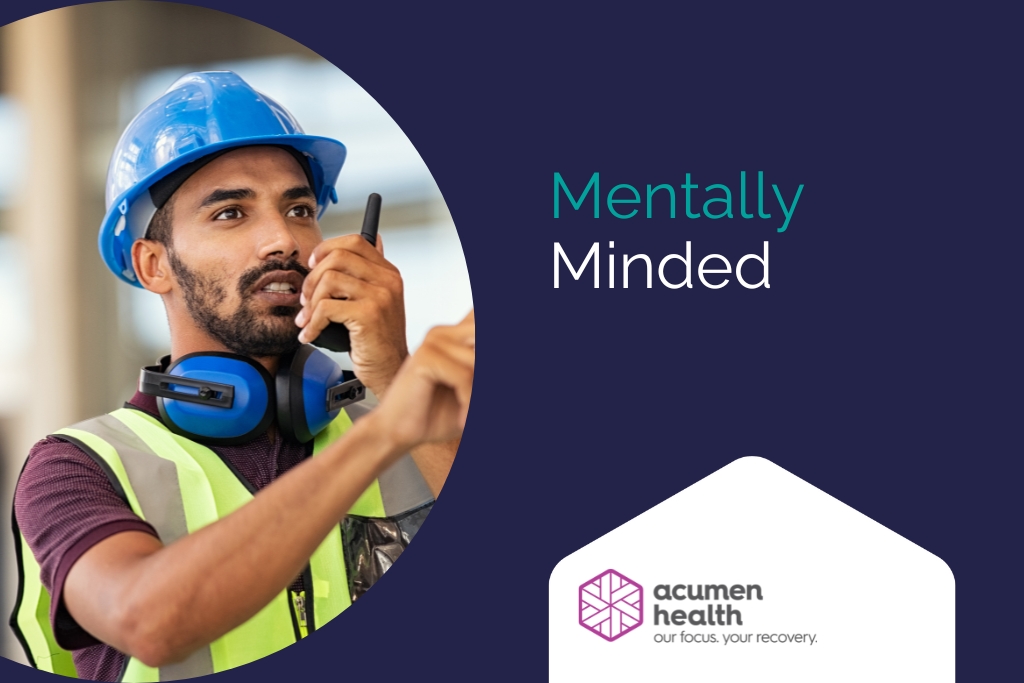August 2023
Anger is a powerful emotion that we all experience at some point in our lives.
It’s a normal response to situations that make us feel threatened, wronged, or frustrated.
But when anger becomes overwhelming or uncontrollable, it can have a negative impact on our wellbeing, relationships, and even our work life.
As men navigating the demands of the workplace, understanding and managing anger is essential for maintaining our mental health and fostering positive connections with colleagues.
In this blog, we’ll explore the dynamics of anger, warning signs to watch for, and effective strategies to handle anger in a healthy way.
The spectrum of anger
Anger isn’t a one-size-fits-all emotion; it exists on a continuum ranging from mild annoyance to intense rage.
Recognising this range can help us acknowledge our emotions and respond appropriately.
Feeling angry is normal; it’s how we deal with it that matters.
Recognising the signs
Anger manifests both physically and emotionally.
Physically, our bodies respond with increased heart rate, muscle tension, and shallow breathing.
Emotionally, we might find ourselves irritable, impatient, or unable to focus. It’s crucial to identify these signs early, as unchecked anger can lead to negative consequences.

Navigating anger in the workplace
For men in the workplace, understanding how to handle anger is crucial. Here are some steps to manage anger in a healthy way:
1. Recognise triggers
Identify situations or events that trigger your anger. By understanding your triggers, you can proactively address them and minimize their impact on your emotions.
For example, imagine you’re working on a project with a tight deadline, and a colleague consistently submits incomplete work, causing delays.
Recognising this trigger – incomplete work – consistently sparks your frustration allows you to address the issue calmly with your colleague.
2. Take a break
When you feel anger escalating, take a step back. A short break can provide the time needed to cool off, reflect, and gain perspective on the situation.
One situation could be during a meeting if a heated debate erupts over differing opinions. Instead of getting caught up in the moment, you can excuse yourself from the meeting briefly.
Taking a break allows you to regain composure, think clearly, and contribute constructively when you return.
3. Practise controlled breathing
Deep breathing can help calm your body’s physical response to anger.
Take a few slow, deep breaths to reduce tension and regain control.
If you’re dealing with a challenging client, you may notice your heart racing and your body tensing up.
By inhaling deeply and exhaling slowly, you can consciously lower your stress levels, enabling you to respond to the client calmly and professionally.

4. Reframe your thoughts
Challenge negative thought patterns that fuel anger.
Replace destructive self-talk with calming statements that promote a more rational perspective.
For example, you receive feedback from your supervisor that highlights areas for improvement.
Instead of becoming defensive and thinking, ‘I can’t believe they’re criticising me’, you remind yourself that feedback is an opportunity to grow.
Doing this regularly will shift your perspective and helps you receive feedback more positively.
5. Communicate effectively
Open, respectful communication is key.
Address conflicts calmly and seek to understand others’ viewpoints before responding.
If a co-worker questions your approach to a project.
Rather than reacting defensively, you listen attentively, ask clarifying questions, and respond calmly, acknowledging their input and offering your reasoning.
6. Find healthy outlets
Engage in activities you enjoy outside of work to release built-up tension.
Physical exercise, creative pursuits, or relaxation techniques can help channel your energy positively.
One example would be after a particularly stressful day at work, you head to the gym for a workout.
Physical activity allows you to release pent-up tension and return home feeling rejuvenated and ready to engage positively with your loved ones.
7. Seek professional help
If despite your efforts, you find that anger continues to impact your interactions at work and home, you should recognise it’s becoming a persistent issue, and seek support from a therapist.
Working with a professional helps you uncover deeper triggers and develop personalised strategies to manage your anger effectively.

Anger disorders and seeking help
It’s important to distinguish between occasional anger and persistent anger disorders.
If you find yourself consistently struggling with explosive episodes of anger, consider reaching out for professional help.
Intermittent explosive disorder is a serious condition that warrants intervention.
Anger is a natural emotion, and learning to manage it is a crucial skill in both personal and professional life.
By recognising triggers, using healthy coping strategies, and seeking help when necessary, we can navigate workplace challenges more effectively and contribute to a healthier, more productive environment.
Remember, seeking help is a sign of strength, not weakness.
As men, taking control of our emotional wellbeing is a vital step toward living happier, healthier lives.
A note on anger disorders
We said that feeling angry is normal and it is okay to experience these emotions.
Everyone will have anger from time to time.
This is why learning the tools and steps to manage and express anger in a healthy way is an important part of life.
Anger disorders refer to a more serious, chronic condition where someone has repeated explosive episodes of impulsive rage.
This is sometimes called intermittent explosive disorder.
If you are concerned this might be something you are experiencing, please do not feel ashamed to seek professional help.
You can start by reaching out to a health support line for guidance or go right ahead and make an appointment to have a chat with your doctor to discuss your concerns and possible treatment options.
References and further resources
- Managing anger – MensLine Australia
- Anger management toolkit – MensLine Australia
- Renovate your relationship manual – MensLine Australia
- Anger management: 10 tips to tame your temper – Mayo Clinic
- 11 anger management strategies to calm you down fast – Verywell Mind
- Anger – Australian Psychological Society
- Anger management: Tips for managing anger and where to get help – Healthdirect
- Understanding anger – headspace
- Anger – Open Arms
- Improving assertiveness self-help resources – Department of Health WA
The following resource has been provided for informational purposes only. As it does not consider your personal circumstances and needs, we recommend you obtain your own professional health advice to determine how this resource may apply to you.




